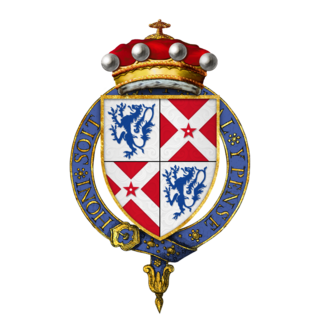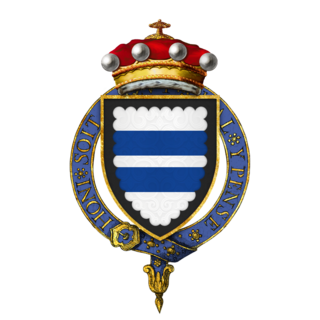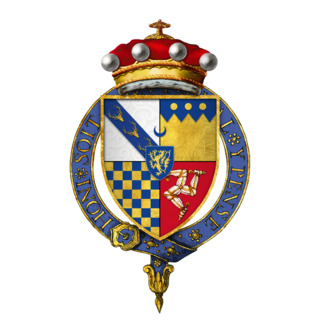
Sir Walter Mildmay was a statesman who served as Chancellor of the Exchequer to Queen Elizabeth I, and founded Emmanuel College, Cambridge.
Baron Wrottesley, of Wrottesley in the County of Stafford, is a title in the Peerage of the United Kingdom. It was created on 11 July 1838 for Sir John Wrottesley, 9th Baronet. He was a Major-General in the Army and also represented Lichfield, Staffordshire and Staffordshire South in House of Commons. The Wrottesley family's original patronymic was 'de Verdun', which meant that the creation of the title Baron Wrottesley represented the third barony created by a branch of the de Verdun family in England. The other two were established by Theobald de Verdun, 1st Baron Verdun of Alton Castle and Sir John de Verdon, 1st Baron Verdon, lord of Brixworth in Northamptonshire and Bressingham in Norfolk.

Sir John Scott, JP of Scot's Hall in Smeeth was a Kent landowner, and committed supporter of the House of York. Among other offices, he served as Comptroller of the Household to Edward IV, and lieutenant to the Lord Warden of the Cinque Ports.

William Neville, Earl of Kent KG and jure uxoris 6th Baron Fauconberg, was an English nobleman and soldier. He fought during the latter part of the Hundred Years War, and during the English dynastic Wars of the Roses.

John Talbot, 2nd Earl of Shrewsbury, 2nd Earl of Waterford, 8th Baron Talbot, KG was an English nobleman and soldier. He was the son of John Talbot, 1st Earl of Shrewsbury, 1st Earl of Waterford, 7th Baron Talbot, 10th Baron Strange of Blackmere, and Maud Neville, 6th Baroness Furnivall.
Henry Pole, 1st Baron Montagu, was an English nobleman, the only holder of the title Baron Montagu under its 1514 creation, and one of the relatives whom King Henry VIII of England had executed for treason.

Sir William Parr, KG (1434–1483) was an English courtier and soldier. He was the eldest son of Sir Thomas Parr (1405–1461) and his wife Alice, daughter of Sir Thomas Tunstall of Thurland, Lancashire.
This is a list of the sheriffs and high sheriffs of Staffordshire.
The Vernon family was a wealthy, prolific and widespread English family with 11th-century origins in Vernon, Normandy, France. Their extant titles include Baron Vernon and Vernon baronets of Shotwick Park.
Sir Walter Beauchamp was an English lawyer who was Speaker of the House of Commons of England between March and May 1416.

Edward Stanley, 1st Baron MonteagleKG (1460?–1523) was an English soldier who became a peer and Knight of the Garter. He is known for his deeds at the Battle of Flodden.

Sir Gilbert Talbot of Grafton, KG, was an English Tudor knight, a younger son of John Talbot, 2nd Earl of Shrewsbury and 2nd Earl of Waterford, and Elizabeth Butler.

Sir William Denys of Dyrham, Gloucestershire, was a courtier of King Henry VIII and High Sheriff of Gloucestershire in 1518 and 1526. The surname is sometimes transcribed as Dennis.

Sir Richard Vernon was an English landowner, MP and speaker of the House of Commons.

Sir Edward Littleton of Pillaton Hall, 4th Baronet, was a long-lived Staffordshire landowner and MP from the extended Littleton/Lyttelton family, who represented Staffordshire in the Parliament of Great Britain and the Parliament of the United Kingdom for a total of 28 years. The last of the Littleton Baronets of Pillaton Hall, he transferred the family seat from eponymous Pillaton to Teddesley Hall, and died childless, leaving the estates to his great-nephew, Edward Walhouse, who became Edward Littleton, 1st Baron Hatherton.
Sir Edward Wotton (1489–1551) was the Treasurer of Calais and a privy councillor to Edward VI of England.
Sir Richard Wrottesley, 7th Baronet of Wrottesley Hall in Staffordshire, was a Member of Parliament, Anglican clergyman and Dean of Worcester.
Sir Edward Devereux was an English politician who sat in the House of Commons, and was an English Baronet.

Sir Walter Wrottesley, 3rd Baronet (c.1659–1712), of Wrottesley Hall, then in Tettenhall, today Perton, in Staffordshire, England.
Sir Henry de Verdun (I) was recorded as being a Knight of Staffordshire in 1227 and 1228 (with his brother Milo de Verdun), and Sheriff of Staffordshire and Coroner there in 1228, seemingly in succession to Henry de Deneston.










